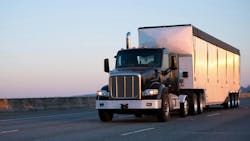Expectations are a funny thing. They can make someone feel pleasantly surprised or disappointed. Sometimes people have unrealistic expectations, which ultimately will cause them to be more than a little disappointed.
That may be the case with battery electric trucks. NACFE staff members have been sharing comments they’ve been hearing from fleets that are disgruntled with the performance of their BEVs, and I can't help but wonder if this has anything to do with expectations.
Back in 2020, NACFE published a thought leadership paper, Defining Production. In putting together the paper, we learned that there is no one definition of what it means for a truck model to be in production. In fact, production can mean different things to different OEMs, fleets, regulators, media, and the public. In the same way, users might also define their expectations differently.
Furthermore, there is the issue of a technology's maturity. Maturity includes the level of risk customers assume that the vehicle they are purchasing will be configured for and operate as needed for their specific duty cycles. The risk is measured by factors like ongoing maintenance costs, warranty claims, downtime percentage, number of product recalls, etc.
See also: NACFE releases new report on electric truck depots
It is important to remember that although BEVs have been on the road for a few years, we are still in the very early stages of their development. As new vehicle concepts mature from an idea to a commercially available unit, they undergo several iterations, sometimes called generations. Each of those iterations should lead to an improved vehicle.
I am sure it is frustrating for fleets to have to deal with the problems that crop up as new technology gets honed until it meets their expectations for reliability, durability, and performance.
OEMs know that fleets will continue to expect to operate their products with acceptable uptimes, improved safety, and low cost of operation, and they are working on improving their electric vehicle offerings to meet those expectations. But until we start seeing full production of BEVs, maybe it’s best to set realistic expectations for their performance. That is not to say that fleets have to settle for trucks that underperform.
If an OEM releases a truck into the market, it is reasonable for a fleet to expect a certain level of reliability. However, that expectation needs to be tempered with the fact that in the early stages of development, there are going to be issues. The good news is that OEMs seem to be doing a decent job of addressing those issues even as they continue to refine and improve the next iteration of their products.
As I see it, the key takeaway here is that expectations need to match reality, but with the understanding that reality will continue to improve and expectations can rise as well.
About the Author

Michael Roeth
Executive Director
Michael Roeth is the executive director of the North American Council for Freight Efficiency. He serves on the second National Academy of Sciences Committee on Technologies and Approaches for Reducing the Fuel Consumption of Medium and Heavy-Duty Vehicles and has held various positions with Navistar and Behr/Cummins.
